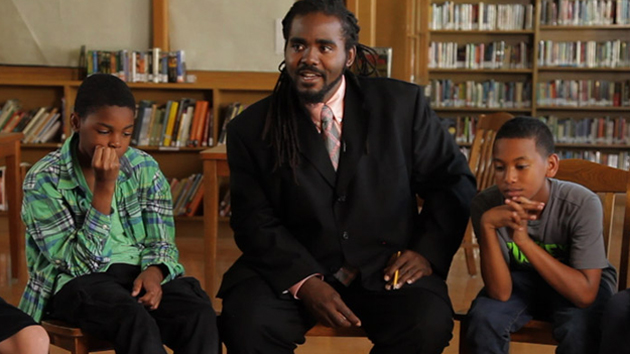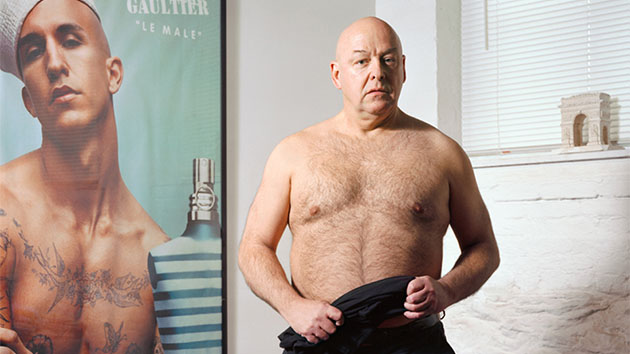
Laura Jane Grace, the 36-year-old frontwoman of the punk band Against Me!, is no longer surprised by the secrets her fans reveal to her. Whether it’s the transgender girls at shows confiding that they had planned to kill themselves until they discovered her music, or the men who resent her for “deceiving” them when she came out in 2012, one of the strangest parts of life as rock and roll’s first trans superstar—the band just kicked off a national tour with Green Day—is the way Grace has become not just a role model but a therapist to many of the thousands of people who buy her albums.
Sometimes she’s a target. “I think you’re an amazing person,” one grammatically challenged man wrote to her on Facebook this past July:
But you’re sending a horrible message to younger generations…I wanted to [do] porn my whole life, [but] my dick wasn’t big enough. You can’t run from who you are. You can change your physical appearance. But when you’re dead the autopsy report wont lie. You can call me an asshole, say I don’t get it. I’ve [come]…to terms with [being] a short white dude with an average penis-size.
Grace showed me this message on her iPhone at Kinfolk, a cafe in Williamsburg, Brooklyn, as we sipped Ethiopian coffees and chatted over the percussive drub of jazzy trip-hop. Grace has long sleeves of tattoos, waist-length auburn hair, and a wide, easy grin that spreads across her face whether she’s talking about the harassment she’s received, her discomfort about being a role model, or why she doesn’t want her mother to read her recent memoir, Tranny: Confessions of Punk Rock’s Most Infamous Anarchist Sellout, co-written with music journalist Dan Ozzi. “It’s not because I’m trans,” she says, flashing that charming grin. “My mom has been the most supportive person in the world. It’s because of all the booze and weed and drugs.”
Tranny is indeed a messy account of sex, brawls, and bad decisions, with enough cocaine in its pages to make Keith Richards blanche. But what saves these foibles from being mere rock clichés is that, as Grace tells it, for nearly half of her 36 years on Earth—15 of them as the singer of Against Me!—she’s relied on these vices to hide her gender dysphoria and her depression from the world and from herself.
Grace is hardly the most famous person to come out as trans in recent years. She joins a growing group of women including Laverne Cox, Caitlyn Jenner, and Hari Nef who have carved out a space in the American cultural imagination as trans role models. But at a time when the rights of transgender people are under attack by the Trump administration, Grace’s refusal to conform to conservative or liberal clichés about her experience has cemented her role as a uniquely complex—and sympathetic—figure.
Her willingness to detail her transition process without hedging or hiding its complications has earned her a loyal fan base among young people hungry for a hero who is tough enough to push back against right-wing antipathy but honest enough to reveal the suffering that has accompanied her journey. “I felt terrible getting up on stage—like, This is embarrassing,” Grace recalls of her first solo tour as a woman back in 2013. “Meanwhile, I was going back to my hotel room every night and trying to kill myself with Ambien and vodka.”
While navigating her gender identity has sometimes put her through hell, it has also added pathos to her art. “You want them to notice / The ragged ends of your summer dress,” Grace sings on “Transgendered Dysphoria Blues,” from her 2014 album of the same name. “You want them to see you/Like they see every other girl./They just see a faggot.”
Grace’s handling of shame and rejection in her songs is delicate, but when she talks about politics—especially Trump’s politics—she’s unforgiving. “There’s something…evil about an administration actively going out and trying to take away rights,” she told Rolling Stone recently. “There’s just something that much more fucked up about going out of your way to be like, ‘We’re taking that protection away from you.'”
Grace’s birth certificate still reads “Thomas James Gabel.” She asked her mom to mail it to her last May, after North Carolina legislators passed House Bill 2, the so-called “bathroom bill,” which also stripped the state’s workers of anti-discrimination protections. (Similar bills have been proposed in New Hampshire, Colorado, and Texas since the election.) Onstage in Durham a week later, she took out a yellow Bic lighter and torched the document, gleefully shouting, “Goodbye, gender!”
Grace grew up mostly in south Florida, the wild child of a military man and, after he left the family, an indulgent single mother who called her ill-behaved boy “Tom Tom Atom Bomb.” After her dad remarried a much younger woman, Tom Tom Atom Bomb’s antics exploded into full-grown juvenile delinquency. She would skip school and spend days alone at home wearing her mom’s clothes, sipping Kahlua, getting high or tripping, and listening to Madonna and Guns ‘N’ Roses. “When I smoked weed or dropped acid,” she says, “what seemed like a fantasy became more real.”
At the age of 13, in a modern twist on the myth of Robert Johnson and the devil at the crossroads, Grace donned her mom’s wedding dress, and while swigging Miller High Life and messing around on her guitar in her basement, she half-jokingly beckoned to Satan: “Please, please let me wake up a woman.” Satan paid no heed, but her jam sessions brought about the first iteration of Against Me!, consisting of Grace on acoustic guitar and vocals and a childhood friend, Kevin Mahon, whacking on a plastic bucket.
With protest songs that sounded like a deranged fusion of Anal Cunt and Woody Guthrie, they became an unlikely hit on the East Coast DIY punk circuit, touring relentlessly in a Ford Econoline van. But when Against Me! signed with Fat Wreck Chords, a small but profitable San Francisco indie label, punk rock purists turned on the duo for supposedly cashing in—the zine Maximum RocknRoll even urged its readers to sabotage their shows.
“People tried to take the instruments out of our hands while we were playing,” Grace writes in Tranny. “They threw stink bombs at us on stage, they poured bleach all over our merch, our van became a traveling canvas for their graffiti.” The puritanical demand for some vague sort of authenticity foreshadowed similar demands from her future transphobic fans—and Grace’s willingness to fight back. At a café venue in Tallahassee, Grace assaulted a man who’d defaced an Against Me! flyer by scribbling “sell out” over her face. As the police escorted her to jail, she saw that staffers had changed the marquis to read: “Tallahassee Punks: 1, Against Me: 0.”
When Grace came out as transgender in a 2012 Rolling Stone profile, it wasn’t just the fulfillment of her deal with the devil; it also provided a fresh opportunity to find a new fan base. “There was a very real emotional block on my side that was always there,” she recalls. Coming out “meant the ending of a lot of relationships, but as far as being in a band and being happy in a band, it worked.”
Yet coming out also brought a new set of problems. Heather Gabel, Grace’s second wife, walked out on her in 2014 because they had grown apart and she was “attracted to men, not women,” Grace told Rolling Stone. The couple’s daughter, then five, pleaded with Grace, “Will you go back to being my daddy?” Onstage, Grace felt pushed to “demonstrate some kind of physical change” to her audiences—”even though I’d been on hormones for a month.” All the pressures culminated in those late-night Ambien and vodka binges. “I found myself feeling like I went from this box, and now I’m in this box and it’s just as suffocating,” Grace tells me. “If I wanted to make a decision like plastic surgery, I should do it because I want to do it, not because I want to please someone.”
“When I look in the mirror, I still feel extreme dysphoria,” Grace adds. “Before I went to bed last night I wrote in my journal, ‘I look like a corpse.’ Not a good-looking corpse either.”
Amid Grace’s depression, in February 2016, at a show at Brooklyn’s Silent Barn, a 15-year-old trans boy named Lee walked up and handed Grace a letter. “Hello Laura,” it began, “if you’re reading this, thank you so much. I’m sorry I’m so anxious, but can you please help me tell my dad I’m not a girl?”
Standing alongside Lee—who has feathery dyed-pink bangs and thick glasses—was his father, Joe, who’d accompanied him to the show. Joe, a former police officer, had no idea his biological daughter identified as a transgender boy. After reading the note, Grace, who hadn’t spoken to her own dad in three years, turned to Joe and delivered the news. Lee stood there in awe of his hero. Joe looked stunned. “Let’s all go in for a hug,” Grace said, extending her arms.
“This culture is still foreign to me,” Joe tells me seven months later. We’re at Rough Trade Records in Brooklyn, a cavernous boutique just two blocks from the café where Grace and I had coffee. Joe and Lee are here to see Against Me! for the fifth time in the past year and a half. It’s a daytime record-release bash for Shape Shift With Me, the band’s latest. Lee has already memorized the lyrics after hearing an early release on NPR. He and Joe listened to it together that morning on the train from Poughkeepsie. “That’s all she’s been doing, listening to that album,” Joe says.
“Daaad!” Lee says, rolling his blue eyes and slapping a hand to his forehead.
“That’s all he’s been doing,” Joe corrects himself, matter-of-factly.
Lee and Joe walk together into a dank back room containing a stage, a bar housed in a shipping container (earplugs: $10), and about 100 fans—many of them young androgynous kids with septum piercings, rainbow hair, black hoodies. “I’m Dante,” one 15-year-old tells me, “but soon I’ll be Zoe. Laura Jane Grace really helped me come out as trans to my family.”
Several other tweens offer variations on the message. Onstage, an amplifier case still bears the faded stencil of Grace’s birth name: GABEL. “What the heck?” I hear another fan say. “I don’t like that.”
Then the band appears. Against Me! is a four-piece now, but for these kids it may as well be a solo act. Clad in Doc Martens, black skinny jeans, and a black sleeveless T-shirt, Grace shoulders her tutone Rickenbacker and steps into a moonbeam of pink fluorescent light. Her hair flies skyward with a head toss. “Let’s play some mid-afternoon rock and roll,” she says into the mic.
The scene is a nice reminder that, for all the attention paid to her trans status, Grace’s most important transformation is from citizen to performer. Wasn’t it on stages like this one, after all, that gender-bending rebels from David Bowie and Boy George to the New York Dolls and Jayne County paved the way for the straight world to get over its hang-ups? And might it also be on stages like this where queer and trans folks find the strength to weather whatever storms may lie ahead? “The only place I’ve ever felt comfortable,” Grace put it to me before the show, “is onstage.”
Cymbals explode, guitars squall, bass rumbles, and the room erupts into dance as Against Me! launches into its first song. Lee is up front, at Laura’s feet, mouthing along to all the lyrics. His pink bangs bounce in 4/4 time and his friend, a trans girl named Zero, hugs him. Joe looks at Lee, then up at Grace, then back to his son, and he grins proudly.
“I just want everyone to feel comfortable,” Grace tells the audience after finishing “Boyfriend,” a song on the new album. “Whatever your gender identity, your sexual orientation, whatever, I just want everyone to feel at home here.” She then breaks into her anthem, “True Trans Soul Rebel,” howling: “Yet to be born, you’re already dead/You sleep with a gun beside you in bed/You follow it through to the obvious end/Slit your veins wide open.”
The room is in a frenzy, oblivious to the darkness of her message, or perhaps buoyed by its unabashed expression. And that’s when the power, and the poignancy, of Grace’s talent hits me: She’s uniquely adept at making others feel good about who they are, and yet she hasn’t figured out how to do the same for herself.
“Who’s gonna take you home tonight?” Grace sings finally, her auburn hair obscuring that gentle grin before she walks off the stage and into the New York City afternoon. “Who’s gonna take you home?”








